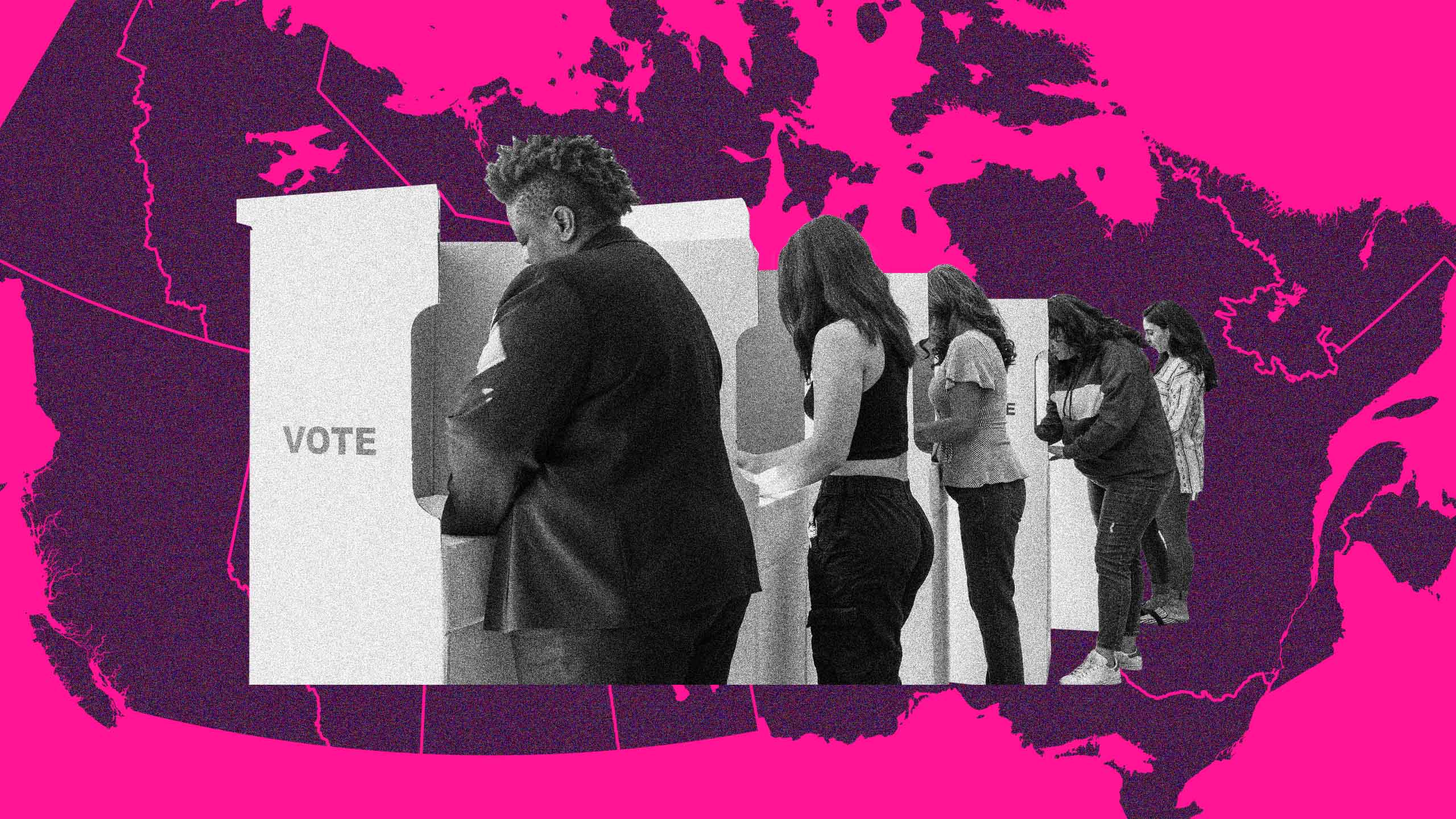Corina Berry grew up going to drop-in programs with the Rainbow Youth program at the Peterborough AIDS Resource Network (PARN). Now, she is studying Gender Studies and Social Justice at Trent University, and is the director of PARN’s Rainbow Youth programming. Berry credits the program’s weekly drop-ins and events with helping her find community and friends that had similar experiences as her. But since the U.S. presidential election, concern for Canada’s LGBTQ2S+ communities losing their rights comes up almost every session. “I’m really scared of what the future looks like,” she says. Berry adds that youth should never have to question if their life is worth living because of an election.
Here in Canada, on March 23, Prime Minister Mark Carney called an election to take place on April 28. For many young LGBTQ2S+ voters, this election feels crucial: it’s occurring in the midst of a significant rise in anti-trans and LGBTQ2S+ hate, on the brink of a recession and when Canada’s sovereignty is being questioned. With so much on the line, young queer voters like Berry are extremely worried going into this election. Speaking to young queer voters shows that they also feel exhausted, citing dissatisfaction with the candidates for prime minister, and the prospect of needing to vote strategically to protect their rights as queer people.
According to Elections Canada, young people tend to vote significantly less than their older counterparts. In the 2021 federal election, 46.7 percent of first-time young electors voted, which is lower than any other age group. First-time young electors are defined by Elections Canada as people between the ages 18 to 24. Elections Canada notes that youth face a diverse set of motivational and access barriers when it comes to voting, including being less informed about ways to vote and register to vote, and/or being unable to meet identification requirements at their polling station. They also trust electoral politics less overall.
Sam Reusch, executive director of Apathy is Boring, “a non-partisan, charitable organization that supports and educates youth to be active and contributing citizens in Canada’s democracy,” says, “I think a lot of young people feel that they’ve been left behind by our government.” For queer youth, the barriers to voting can be even higher. David Hawkins, the executive director of the West Island LGBTQ2+ Centre in Montreal, notes that members of the LGBTQ2S+ community usually earn less, making it harder for them to take time out of their workdays to go vote. Hawkins notes that many trans and gender nonconforming people also face the risk of prejudice or discrimination when showing up to their polling place. When speaking about this, Hawkins is reminded of his friend who is genderqueer and consciously decided to keep their assigned gender at birth on their ID to avoid harassment.
Yet, on top of these barriers that young queer voters face, the stakes of this election have never been higher for them. From the multiple anti-trans marches across the country. to provinces like Alberta and Saskatchewan passing laws that infringe on the safety of trans youth, anti-trans and anti-LGBTQ2S+ rhetoric has gained a concerning amount of momentum in the past few years. Donald Trump winning the 2024 U.S. election only pushed this rhetoric further into the mainstream. “My younger sister, who is 20, was like, ‘Where do we move?’” says Blake Tait, in response to the possibility of Pierre Poilievre becoming prime minister. Tait is a young trans activist living in Saskatoon. He feels stressed about the election, but hopeful due to polls showing real chances for a Liberal win. “It did feel like a foregone conclusion federally for so long, and for it to not necessarily feel that way anymore is very exciting.”
“I think people are starting to realize that using queer and trans issues as a scapegoat is always hiding something bigger”
Saskatchewan had its provincial election in October 2024. It’s a province where LGBTQ2S+ rights have been pushed to the forefront of political conversation. Bill 137, or, the “Parents’ Bill of Rights,” garnered widespread media attention in 2023 for requiring parental permission for students under 16 to change their name and pronouns, and severely limited students’ access to sex-ed in schools. “I think people are starting to realize that using queer and trans issues as a scapegoat is always hiding something bigger, and I think there’s the fear that this comes on a national stage,” says Tait. This is reflected in Tait’s voting priorities. To him, LGBTQ2S+ rights are an important part of a set of issues that he would like to see political candidates tackle—issues that include his home province of Saskatchewan being regularly overlooked on a federal level.
Hawkins holds a different view. He feels that the political landscape has changed since the time he began voting, where the LGBTQ2S+ community has been placed at the centre of political conversation.
In Ontario, Berry knows first-hand the stakes that queer youth face in this election. The region that PARN serves has a severe lack of clinics that provide gender-affirming care. Berry says that the nearest clinic people use is in Oshawa, nearly an hour away by car, and even longer by bus. A Conservative government might decimate an already lacking system. Pierre Poilievre, the leader of the federal conservative party, has said that minors should not have access to puberty blockers, and has voiced support for banning trans women and girls from sports, change rooms and bathrooms. At the Conservative Party of Canada policy convention in 2023, delegates echoed Poilievre’s views and voted in favour of limiting trans healthcare for minors. But Berry is frustrated about the prospect of strategically voting for a candidate she feels lukewarm about to prevent a Conservative victory. “We have to vote for who we would rather be protesting against, which is really disappointing.” Ontario recently had a provincial election, with disappointing 49.7 percent voter turnout. Despite Berry and most of her colleagues voting in the provincial election, she understands why exhaustion toward the constant need to vote strategically can make a lot of people stop showing up to the polls altogether. In Tait’s province, strategic voting is a reality that many are facing as well. “Any seat that is not a Maple MAGA seat is a good seat to me,” he says.
The low turnout is more pronounced in LGBTQ2S+ populations. In “Profile of the Lesbian, Gay, Bisexual Electorate in Canada,” a chapter from the book Queering Representation: LGBTQ People and Electoral Politics in Canada, published in 2019, researchers found that LGBTQ2S+ respondents were generally more politically engaged than their heterosexual counterparts, except for their propensity to vote. Tait and Berry are both voting this election, and are urging other young queer voters to do the same. Tait understands why queer people might be even more disillusioned by electoral politics than straight people, but he’s seen the impact that a motivated voter base can have on election outcomes. For Saskatchewan’s provincial election in October 2024, despite turnout being only 53 percent, the NDP doubled the amount of seats they won in 2020. Tait believes this was in part due to queer people and allies mobilizing in the lead-ups to those elections.
This federal election is occurring amidst a rise in right-wing ideology around the world. Yet, regardless of the outcome, Berry is ready to support queer and trans youth along the tough road ahead. “It can’t really be better until politicians are better,” she says. “I need to do everything I can to make sure that [queer youth] have a space where they feel accepted and welcome.” Despite general fatigue toward the electoral system, it’s imperative for queer youth to vote because their rights are on the line. Tait sees it as a duty to one’s community. “In order to work for your community, and live in your community, you have the responsibility to vote, and to vote for your community.”
With the 2025 Canadian federal election underway, Xtra is bringing back our weekly pop-up election newsletter, Rainbow Votes. Subscribe now for free exclusive reporting, analysis and opinion in your inbox every Thursday.


 Why you can trust Xtra
Why you can trust Xtra


